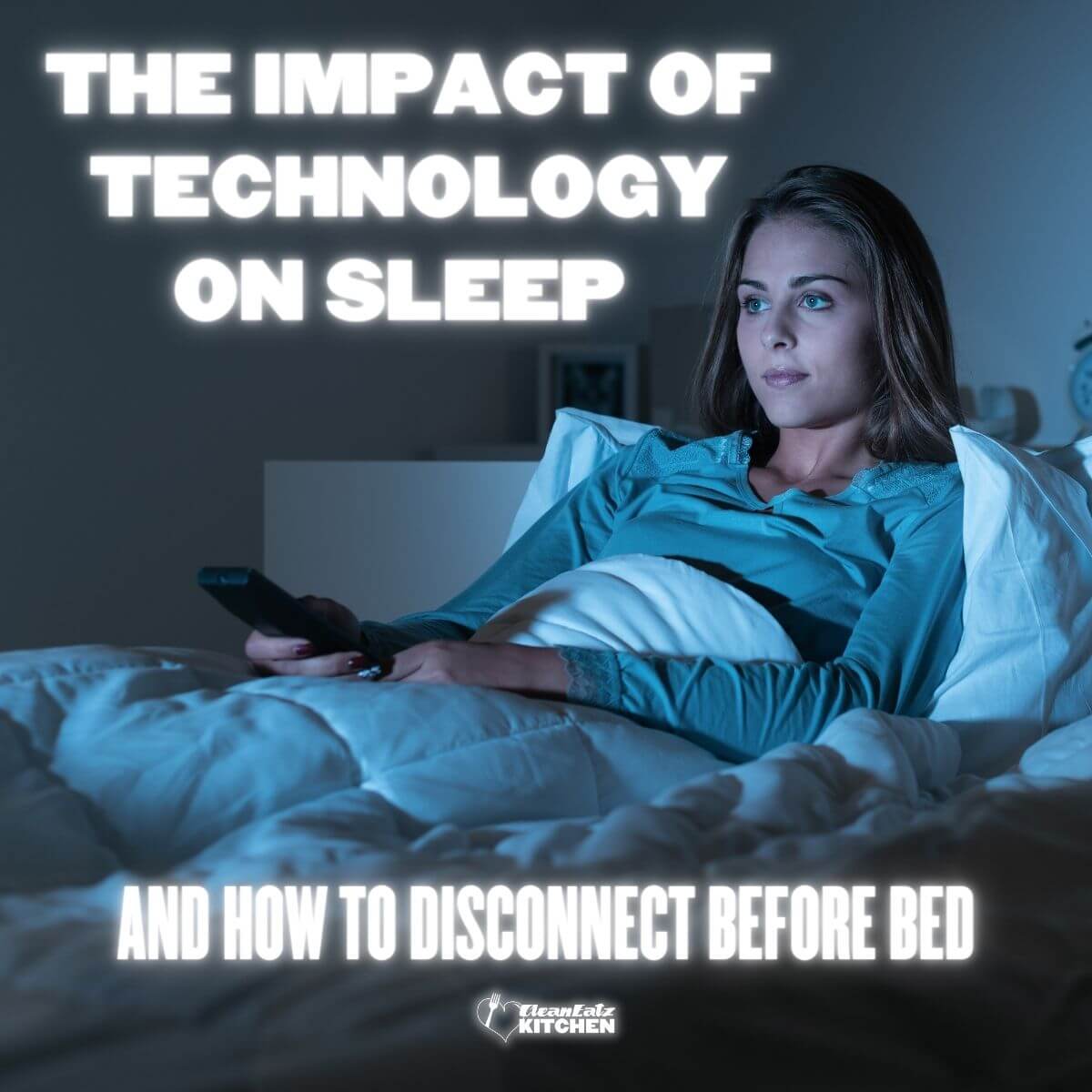
The Impact Of Technology On Sleep And How To Disconnect Before Bed
Jason Nista
Healthy Lifestyle
|
Sleep
9 minute read
The use of technology has become an integral part of our daily lives, but with its many benefits comes the potential for negative effects as well. One of the areas in which technology has had a significant impact is sleep. In this article, we will explore the negative impact of technology on sleep, the importance of disconnecting before bed, and tips for better sleep.
Blue Light and Sleep: Understand the Impact and Discover Solutions
Blue light is a type of light that is part of the visible light spectrum. It has a wavelength of around 480 nm, which is shorter than other types of light, such as red and green. Blue light and sleep are a topic of many discussions when it comes to people's health. This light is found in many natural sources, such as the sun and the sky, but it is also emitted by electronic devices such as smartphones, tablets, laptops, and LED televisions. In fact, the screens of these devices are the main source of blue light exposure for many people.
During the day, exposure to blue light can be beneficial. It can help improve mood, boost alertness and cognitive function, and regulate the body's natural sleep-wake cycle. However, exposure to blue light at night can disrupt the body's sleep-wake cycle. This is because the blue light emitted by electronic devices can suppress the production of melatonin, a hormone that regulates sleep. This can make falling asleep harder and lead to insomnia or other sleep disorders.
How Does Blue Light Affect Our Sleep?
Exposure to blue light at night can significantly impact our sleep. As mentioned earlier, the blue light emitted by electronic devices can suppress the production of melatonin, a hormone that regulates our sleep-wake cycle. This can make falling asleep harder and lead to insomnia or other sleep disorders. "Is 5 hours of sleep enough?" this is a question asked by many but only a few people take it seriously. And even fewer people realize how important it is to prevent blue light exposure when sleeping.
Additionally, blue light exposure can also disrupt the body's natural sleep-wake cycle or circadian rhythm. Our bodies are designed to be active during the day and to wind down at night. The blue light from electronic devices can make it harder for our bodies to recognize that it's nighttime and to start producing melatonin, which can lead to difficulty sleeping and fatigue during the day. Understanding the stages of sleep is crucial here.
Consequences of Long-term Exposure to Blue Light
Long-term exposure to blue light can have a number of negative consequences for our health. It can lead to sleep disorders, fatigue, and even depression. Additionally, blue light exposure at night can increase the risk of certain diseases, such as obesity, diabetes, and cancer.
Long-term exposure to blue light can also have an impact on our eyes. It can cause digital eye strain, which can lead to symptoms such as dry eyes, headaches, and blurred vision. Furthermore, blue light exposure at night can also increase the risk of age-related macular degeneration, which is a leading cause of blindness.
Tips to Reduce Blue Light Exposure Before Bedtime
If you're having trouble sleeping at night due to blue light exposure, there are several things you can do to reduce your exposure and improve your sleep.
Use a blue light filter on your electronic devices: Many smartphones and tablets have built-in blue light filters or "night mode" settings that can reduce the amount of blue light emitted by the screen.
Dim your screen: Lowering the brightness of your screen can also help reduce blue light exposure.
Use amber-tinted glasses: These glasses can block blue light and can be worn in the evening to reduce exposure.
Use apps that mimic a sunset: Some apps can gradually reduce the amount of blue light emitted from your device as it gets closer to bedtime to help your body prepare for sleep.
Avoid electronic devices for at least an hour before bed: This can help reduce your exposure to blue light and can help your body prepare for sleep.
Alternatives to Electronic Devices for Bedtime Activities
Finding alternative activities to do before bed is essential if you're having trouble sleeping at night due to blue light exposure.
Read a book: This is a great way to wind down before bed and can help you fall asleep more quickly.
Listen to music or a podcast: This can be a relaxing way to unwind before bed and help you fall asleep more quickly.
Practice yoga or meditation: Yoga & meditation can be very relaxing and can help you fall asleep more quickly.
Take a warm bath or shower: This can help you relax and can help your body prepare for sleep.
Blue light is an essential part of our daily lives; it helps us stay alert during the day, but excessive exposure to it at night can significantly impact our sleep. By understanding the effects of blue light on sleep and taking steps to reduce exposure, you can improve your sleep and overall well-being. Whether using a blue light filter on your electronic devices, reading a book, or practicing yoga, there are many ways to reduce your exposure to blue light and improve your sleep.
In addition to these alternative bedtime activities, consider Cleaneatzkitchen's meal plan delivery. Our nutritious meals support your well-being, including better sleep. By nourishing your body, you prioritize rest and health. Whether you choose yoga or our meals, invest in your wellness.
Disconnecting Mentally Before Bed
Distracting and Stimulating Content
Many of us use our phones, laptops, and tablets before bed, exposing ourselves to stimulating content that can make it difficult to fall asleep. The constant notifications, social media feeds, and news updates can be distracting and cause anxiety, which can further interfere with our sleep.
The Difficulty in Disconnecting from Technology
Disconnecting from technology has become a challenge for many of us. It can be difficult to put down our devices and disconnect from the digital world, especially when we are used to being connected 24/7. This constant connection to technology can make it difficult to relax and wind down before bed, which can lead to sleep difficulties.
According to a study conducted by the National Sleep Foundation, 95% of Americans use some form of technology within an hour of going to bed, and over 75% of people sleep with their phones next to their beds. This constant connection to technology can have a significant impact on our sleep quality and overall health.
The Importance of Disconnecting Before Bed
Disconnecting from technology before bed is essential for getting a good night's sleep. Here are some benefits of disconnecting from technology and why it is important to do so:
- Improved sleep quality: By disconnecting from technology, you can create a relaxing environment and reduce stimulation, which can lead to better sleep.
- Reduced stress and anxiety: Being constantly connected to technology can cause stress and anxiety. Disconnecting before bed can help you relax and reduce these negative emotions.
- Improved mental and physical health: Getting enough sleep is crucial for our mental and physical health. By disconnecting from technology and getting better sleep, we can improve our overall well-being.
Techniques for Disconnecting from Technology Before Bed
Here are some techniques for disconnecting from technology before bed:
Setting Boundaries and Setting Aside Time for Technology-Free Activities
Setting boundaries for technology use can help you disconnect before bed. You can set aside specific times for technology-free activities, such as reading a book, meditating, or practicing yoga. This can help you wind down and get into a more relaxed state before bed.
Implementing a Tech-Free Bedtime Routine
Implementing a tech-free bedtime routine can help you disconnect from technology and get into a sleep-conducive state. This can include activities such as taking a warm bath, reading a book, or listening to relaxing music. By creating a relaxing bedtime routine, you can train your mind and body to associate bedtime with sleep and relaxation.
Using Apps and Tools to Limit Screen Time
There are many apps and tools available that can help you limit your screen time and disconnect from technology. These include apps that track your screen time and remind you to take breaks, as well as tools that reduce blue light exposure. By using these tools, you can reduce the negative impact of technology on your sleep and promote better sleep hygiene.
Other Tips for Better Sleep
In addition to disconnecting from technology, there are several other tips that can help you get a better night's sleep:
Maintain a Consistent Sleep Schedule
Maintaining a consistent sleep schedule is crucial for getting a good night's sleep. Going to bed and waking up at the same time every day can help regulate your circadian rhythm and promote better sleep.
Creating a Relaxing Bedtime Routine
As mentioned previously, creating a relaxing bedtime routine can help you disconnect from technology and wind down before bed. This can include activities such as taking a warm bath, reading a book, or meditating. By doing so, you can get into a sleep-conducive state and improve your sleep quality.
Staying Active During the Day
Staying active during the day can help you sleep better at night. Regular exercise and physical activity can improve your sleep quality and help you fall asleep faster.
Limiting Caffeine and Alcohol Consumption Before Bed
Limiting caffeine and alcohol consumption before bed can also improve your sleep quality. Caffeine and alcohol are stimulants that can interfere with your sleep and make it harder for you to fall asleep and stay asleep. By limiting their consumption, you can improve your sleep quality and get a better night's sleep.
FAQs
How do I stop using technology before bed?
To stop using technology before bed, you can implement a relaxing bedtime routine, use apps and tools to limit screen time, and create a relaxing sleep environment.
How long before bed should you stop using technology?
It is recommended to stop using technology at least 30 minutes to an hour before bed to allow your brain to wind down and prepare for sleep.
Related Articles
Tips On How To Stay Active During Travel And On The Go
10 minute read
How To Overcome Jet Lag and Adjust to New Time Zone
8 minute read
What is Batch Cooking? Benefits of Batch Cooking
9 minute read



